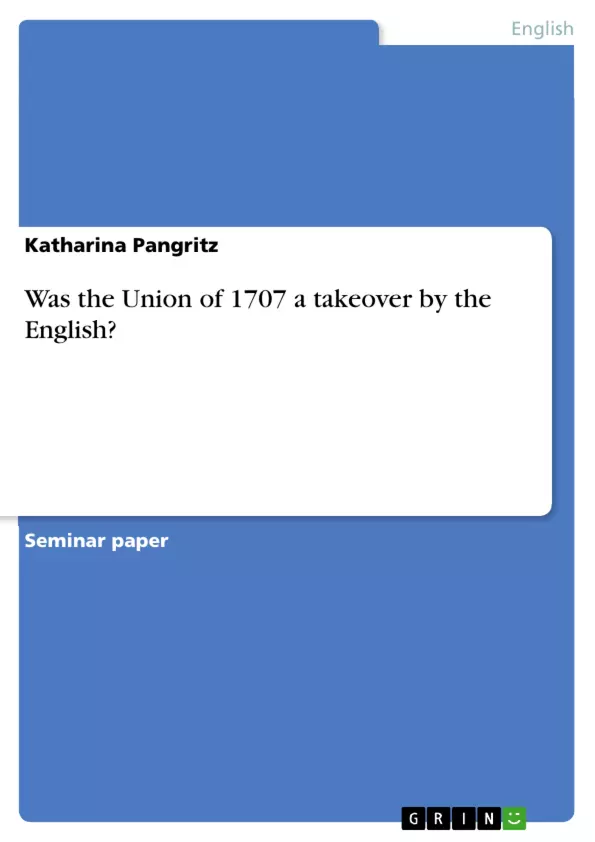In this paper the political, economic and religious aspects, which led to the Act of Union in 1707, are exposed. In addition to that the consequences of the union after 1707 will be analyzed in order to show the profits and losses for Scotland. By the different aspects the events of the time are analyzed and hence a possible takeover by the English is determined.
The English Parliament united with the Scottish Parliament by the Treaty of Union in 1707. The Union of Parliaments was a moment full of changes for Scotland. Economics, religion as well as politics of Scotland in many respects had to adjust to England. The question we consequently need to ask ourselves is, whether the events of the union can be described as a takeover? Was the union with the English Parliament avertable or could Scotland have endured without England?
Table of Contents
- Introduction
- Scotland before the Union of Parliaments
- Pre-union politics
- Pre-union economy
- Pre-union religion
- Scotland after the Union of Parliaments
- Post-union politics
- Post-union economy
- Post-union religion
- Conclusion
- References
Objectives and Key Themes
This term paper examines the Union of Parliaments in 1707, investigating whether it constituted a takeover of Scotland by England. The analysis focuses on the political, economic, and religious factors leading up to the Act of Union and its consequences for Scotland. The paper aims to determine if the union was inevitable or if Scotland could have survived independently.
- The political landscape of Scotland before and after the Union of 1707.
- The economic conditions in Scotland before and after the Union of 1707 and the impact of the Union on Scottish trade.
- The religious climate in Scotland before and after the Union and the role of religion in shaping political events.
- The Act of Security and the Anent of Peace and War, and their implications for Scottish independence.
- The Alien Act of 1705 and its potential impact on the Scottish economy.
Chapter Summaries
Introduction: This chapter introduces the central question of the term paper: Was the Union of 1707 a takeover by England? It outlines the paper's scope, focusing on the political, economic, and religious aspects leading up to and following the Act of Union. The chapter establishes the need to analyze the events surrounding the union to determine whether it was avoidable or whether Scotland could have flourished without English involvement. It sets the stage for a comprehensive examination of the pre- and post-union conditions in Scotland.
Scotland before the Union of Parliaments: This chapter explores the state of Scotland in the late 17th century, providing the historical context necessary to understand the events that led to the Act of Union. It examines the political climate under King James II, the Glorious Revolution, the Bill of Rights, and the subsequent Act of Settlement. Crucially, it details the Scottish Parliament's response to the Act of Settlement, including the passing of the Act of Security and the Anent of Peace and War. These acts highlight Scotland's determination to maintain its independence in matters of succession, foreign policy, trade, and church governance, underscoring the tensions between Scotland and England that ultimately culminated in the Union.
Keywords
Union of Parliaments, Act of Union 1707, Scotland, England, political history, economic history, religious history, Act of Security, Anent of Peace and War, Alien Act 1705, Scottish independence, Hanoverian succession, Bill of Rights, Glorious Revolution.
Frequently Asked Questions: A Comprehensive Language Preview
What is the main topic of this document?
This document provides a comprehensive preview of a term paper examining the Union of Parliaments in 1707 between Scotland and England. It explores whether the union constituted a takeover of Scotland by England, analyzing the political, economic, and religious factors involved.
What information is included in this preview?
The preview includes a table of contents, objectives and key themes, chapter summaries, and keywords. It offers a detailed overview of the paper's scope and arguments.
What are the key themes explored in the term paper?
The key themes focus on the political, economic, and religious landscapes of Scotland before and after the 1707 Union. It investigates the impact of the Union on Scottish trade, politics, and religion, and examines crucial legislation such as the Act of Security, the Anent of Peace and War, and the Alien Act of 1705.
What is the central research question of the term paper?
The central question is whether the Union of 1707 was a takeover of Scotland by England. The paper aims to determine if the union was inevitable or if Scotland could have survived and potentially thrived independently.
What historical context is provided in the preview?
The preview provides context by mentioning key events like the reign of King James II, the Glorious Revolution, the Bill of Rights, and the Act of Settlement. It highlights Scotland's attempts to maintain independence through legislation like the Act of Security and the Anent of Peace and War.
What are the chapter summaries included in the preview?
The preview includes summaries for the introduction and the chapter on Scotland before the Union of Parliaments. The introduction sets the stage, while the chapter summary on pre-Union Scotland details the political, economic, and religious climate leading up to the Act of Union.
What keywords are associated with this term paper?
Keywords include: Union of Parliaments, Act of Union 1707, Scotland, England, political history, economic history, religious history, Act of Security, Anent of Peace and War, Alien Act 1705, Scottish independence, Hanoverian succession, Bill of Rights, and Glorious Revolution.
What is the purpose of this language preview?
This language preview serves as a comprehensive overview of the term paper's content, allowing readers to quickly understand its scope, arguments, and key findings before engaging with the full text.
- Quote paper
- Katharina Pangritz (Author), 2013, Was the Union of 1707 a takeover by the English?, Munich, GRIN Verlag, https://www.grin.com/document/511785



